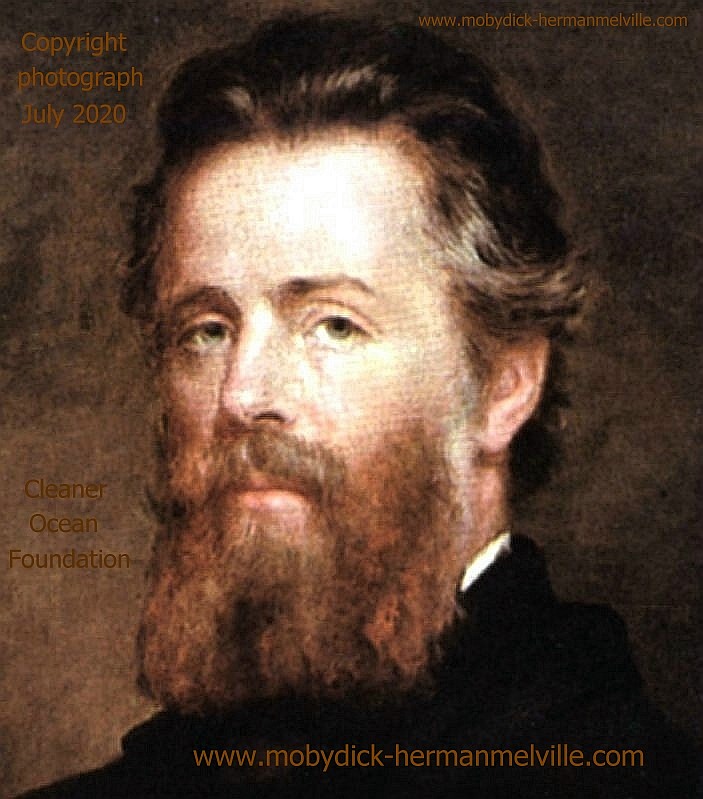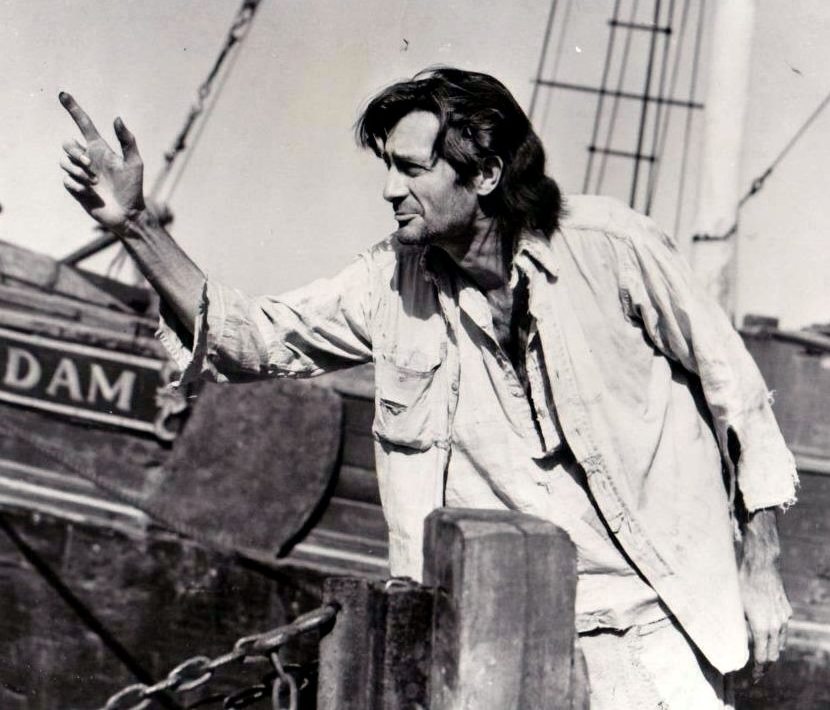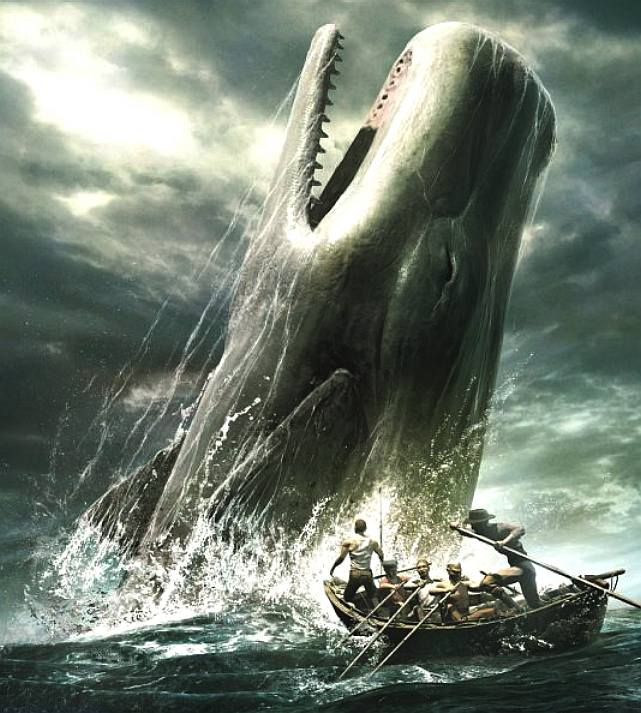
Herman
Melville was the author of a story about what we'd now consider an illegal activity,
the commercial hunting of whales for oil and meat. Whaling is still
carried out by Japan, Iceland and Canada, among other nations, though
most nations voluntarily abstain in the interests of conserving these
magnificent animals - as per International
Whaling Commission guidelines.

Back
<<<
CHAPTER 19. The
Prophet
"Shipmates, have ye shipped in that ship?"
Queequeg and I had just left the Pequod, and were sauntering away from the water, for the moment each occupied with his own thoughts, when the above words were put to us by a stranger, who, pausing before us, levelled his massive forefinger at the vessel in question. He was but shabbily apparelled in faded jacket and patched trowsers; a rag of a black handkerchief investing his neck. A confluent small-pox had in all directions flowed over his face, and left it like the complicated ribbed bed of a torrent, when the rushing waters have been dried up.
"Have ye shipped in her?" he repeated.
"You mean the ship Pequod, I suppose," said I, trying to gain a little more time for an uninterrupted look at him.
"Aye, the Pequod—that ship there," he said, drawing back his whole arm, and then rapidly shoving it straight out from him, with the fixed bayonet of his pointed finger darted full at the object.
"Yes," said I, "we have just signed the articles."
"Anything down there about your souls?"
"About what?"
"Oh, perhaps you hav'n't got any," he said quickly. "No matter though, I know many chaps that hav'n't got any,—good luck to 'em; and they are all the better off for it. A soul's a sort of a fifth wheel to a wagon."
"What are you jabbering about, shipmate?" said I.
"HE'S got enough, though, to make up for all deficiencies of that sort in other chaps," abruptly said the stranger, placing a nervous emphasis upon the word HE.
"Queequeg," said I, "let's go; this fellow has broken loose from somewhere; he's talking about something and somebody we don't know."
"Stop!" cried the stranger. "Ye said true—ye hav'n't seen Old Thunder yet, have ye?"
"Who's Old Thunder?" said I, again riveted with the insane earnestness of his manner.
"Captain Ahab."
"What! the captain of our ship, the Pequod?"
"Aye, among some of us old sailor chaps, he goes by that name. Ye hav'n't seen him yet, have ye?"
"No, we hav'n't. He's sick they say, but is getting better, and will be all right again before long."
"All right again before long!" laughed the stranger, with a solemnly derisive sort of laugh. "Look ye; when Captain Ahab is all right, then this left arm of mine will be all right; not before."
"What do you know about him?"
"What did they TELL you about him? Say that!"
"They didn't tell much of anything about him; only I've heard that he's a good whale-hunter, and a good captain to his crew."
"That's true, that's true—yes, both true enough. But you must jump when he gives an order. Step and growl; growl and go—that's the word with Captain Ahab. But nothing about that thing that happened to him off
Cape
Horn, long ago, when he lay like dead for three days and nights; nothing about that deadly skrimmage with the Spaniard afore the altar in Santa?—heard nothing about that, eh? Nothing about the silver calabash he spat into? And nothing about his losing his leg last voyage, according to the prophecy. Didn't ye hear a word about them matters and something more, eh? No, I don't think ye did; how could ye? Who knows it? Not all Nantucket, I guess. But hows'ever, mayhap, ye've heard tell about the leg, and how he lost it; aye, ye have heard of that, I dare say. Oh yes, THAT every one knows a'most—I mean they know he's only one leg; and that a parmacetti took the other off."
"My friend," said I, "what all this gibberish of yours is about, I don't know, and I don't much care; for it seems to me that you must be a little damaged in the head. But if you are speaking of Captain Ahab, of that ship there, the Pequod, then let me tell you, that I know all about the loss of his leg."
"ALL about it, eh—sure you do?—all?"
"Pretty sure."
With finger pointed and eye levelled at the Pequod, the beggar-like stranger stood a moment, as if in a troubled reverie; then starting a little, turned and said:—"Ye've shipped, have ye? Names down on the papers? Well, well, what's signed, is signed; and what's to be, will be; and then again, perhaps it won't be, after all. Anyhow, it's all fixed and arranged a'ready; and some sailors or other must go with him, I suppose; as well these as any other men, God pity 'em! Morning to ye, shipmates, morning; the ineffable heavens bless ye; I'm sorry I stopped ye."
"Look here, friend," said I, "if you have anything important to tell us, out with it; but if you are only trying to bamboozle us, you are mistaken in your game; that's all I have to say."
"And it's said very well, and I like to hear a chap talk up that way; you are just the man for him—the likes of ye. Morning to ye, shipmates, morning! Oh! when ye get there, tell 'em I've concluded not to make one of 'em."
"Ah, my dear fellow, you can't fool us that way—you can't fool us. It is the easiest thing in the world for a man to look as if he had a great secret in him."
"Morning to ye, shipmates, morning."
"Morning it is," said I. "Come along, Queequeg, let's leave this crazy man. But stop, tell me your name, will you?"
"Elijah."
Elijah! thought I, and we walked away, both commenting, after each other's fashion, upon this ragged old sailor; and agreed that he was nothing but a humbug, trying to be a bugbear. But we had not gone perhaps above a hundred yards, when chancing to turn a corner, and looking back as I did so, who should be seen but Elijah following us, though at a distance. Somehow, the sight of him struck me so, that I said nothing to Queequeg of his being behind, but passed on with my comrade, anxious to see whether the stranger would turn the same corner that we did. He did; and then it seemed to me that he was dogging us, but with what intent I could not for the life of me imagine. This circumstance, coupled with his ambiguous, half-hinting, half-revealing, shrouded sort of talk, now begat in me all kinds of vague wonderments and half-apprehensions, and all connected with the Pequod; and
Captain Ahab; and the leg he had lost; and the Cape Horn fit; and the silver calabash; and what Captain Peleg had said of him, when I left the ship the day previous; and the prediction of the squaw Tistig; and the voyage we had bound ourselves to sail; and a hundred other shadowy things.
I was resolved to satisfy myself whether this ragged Elijah was really dogging us or not, and with that intent crossed the way with Queequeg, and on that side of it retraced our steps. But
Elijah passed on, without seeming to notice us. This relieved me; and once more, and finally as it seemed to me, I pronounced him in my heart, a humbug.
Next
>>>
BOOK
CHAPTERS
CHAPTER 1. Loomings.
CHAPTER
2. The Carpet-Bag.
CHAPTER
3. The Spouter-Inn.
CHAPTER
4. The Counterpane.
CHAPTER
5. Breakfast.
CHAPTER
6. The Street.
CHAPTER
7. The Chapel.
CHAPTER
8. The Pulpit.
CHAPTER
9. The Sermon.
CHAPTER
10. A Bosom Friend.
CHAPTER
11. Nightgown.
CHAPTER
12. Biographical.
CHAPTER
13. Wheelbarrow.
CHAPTER
14. Nantucket.
CHAPTER
15. Chowder.
CHAPTER
16. The Ship.
CHAPTER
17. The Ramadan.
CHAPTER
18. His Mark.
CHAPTER
19. The Prophet.
CHAPTER
20. All Astir.
CHAPTER
21. Going Aboard.
CHAPTER
22. Merry Christmas.
CHAPTER
23. The Lee Shore.
CHAPTER
24. The Advocate.
CHAPTER
25. Postscript.
CHAPTER
26. Knights and Squires.
CHAPTER
27. Knights and Squires.
CHAPTER
28. Ahab, Captain.
CHAPTER
29. Enter Ahab; to Him, Stubb.
CHAPTER
30. The Pipe.
CHAPTER
31. Queen Mab.
CHAPTER
32. Cetology.
CHAPTER
33. The Specksnyder.
CHAPTER
34. The Cabin-Table.
CHAPTER
35. The Mast-Head.
CHAPTER
36. The Quarter-Deck.
CHAPTER
37. Sunset.
CHAPTER
38. Dusk.
CHAPTER
39. First Night Watch.
CHAPTER
40. Midnight, Forecastle.
CHAPTER
41. Moby Dick.
CHAPTER
42. The Whiteness of The Whale.
CHAPTER
43. Hark!
CHAPTER
44. The Chart.
CHAPTER
45. The Affidavit.
CHAPTER
46. Surmises.
CHAPTER
47. The Mat-Maker.
CHAPTER
48. The First Lowering.
CHAPTER
49. The Hyena.
CHAPTER
50. Ahab's Boat and Crew. Fedallah.
CHAPTER
51. The Spirit-Spout.
CHAPTER
52. The Albatross.
CHAPTER
53. The Gam.
CHAPTER
54. The Town-Ho's Story.
CHAPTER
55. Of the Monstrous Pictures of Whales.
CHAPTER
56. Of the Less Erroneous Pictures of Whales, and the True
CHAPTER
57. Of Whales in Paint; in Teeth; in Wood; in Sheet-Iron; in
CHAPTER
58. Brit.
CHAPTER
59. Squid.
CHAPTER
60. The Line.
CHAPTER
61. Stubb Kills a Whale.
CHAPTER
62. The Dart.
CHAPTER
63. The Crotch.
CHAPTER
64. Stubb's Supper.
CHAPTER
65. The Whale as a Dish.
CHAPTER
66. The Shark Massacre.
CHAPTER
67. Cutting In
CHAPTER
69. The Funeral.
CHAPTER
70. The Sphynx.
CHAPTER
71. The Jeroboam's Story.
CHAPTER
72. The Monkey-Rope.
CHAPTER
73. Stubb and Flask Kill a Right Whale; and Then Have a Talk
CHAPTER
74. The Sperm Whale's Head—Contrasted View.
CHAPTER
75. The Right Whale's Head—Contrasted View.
CHAPTER
76. The Battering-Ram.
CHAPTER
77. The Great Heidelburgh Tun.
CHAPTER
78. Cistern and Buckets.
CHAPTER
79. The Prairie.
CHAPTER
80. The Nut.
CHAPTER
81. The Pequod Meets The Virgin.
CHAPTER
82. The Honour and Glory of Whaling.
CHAPTER
83. Jonah Historically Regarded.
CHAPTER
84. Pitchpoling.
CHAPTER
85. The Fountain.
CHAPTER
86. The Tail.
CHAPTER
87. The Grand Armada.
CHAPTER
88. Schools and Schoolmasters.
CHAPTER
89. Fast-Fish and Loose-Fish.
CHAPTER
90. Heads or Tails.
CHAPTER
91. The Pequod Meets The Rose-Bud.
CHAPTER
92. Ambergris.
CHAPTER
93. The Castaway.
CHAPTER
94. A Squeeze of the Hand.
CHAPTER
95. The Cassock.
CHAPTER
96. The Try-Works.
CHAPTER
97. The Lamp.
CHAPTER
98. Stowing Down and Clearing Up.
CHAPTER
99. The Doubloon.
CHAPTER
100. Leg and Arm.
CHAPTER
101. The Decanter.
CHAPTER
102. A Bower in the Arsacides.
CHAPTER
103. Measurement of The Whale's Skeleton.
CHAPTER
104. The Fossil Whale.
CHAPTER
105. Does the Whale's Magnitude Diminish?—Will He Perish?
CHAPTER
106. Ahab's Leg.
CHAPTER
107. The Carpenter.
CHAPTER
108. Ahab and the Carpenter.
CHAPTER
109. Ahab and Starbuck in the Cabin.
CHAPTER
110. Queequeg in His Coffin.
CHAPTER
111. The Pacific.
CHAPTER
112. The Blacksmith.
CHAPTER
113. The Forge.
CHAPTER
114. The Gilder.
CHAPTER
115. The Pequod Meets The Bachelor.
CHAPTER
116. The Dying Whale.
CHAPTER
117. The Whale Watch.
CHAPTER
118. The Quadrant.
CHAPTER
119. The Candles.
CHAPTER
120. The Deck Towards the End of the First Night Watch.
CHAPTER
121. Midnight.—The Forecastle Bulwarks.
CHAPTER
122. Midnight Aloft.—Thunder and Lightning.
CHAPTER
123. The Musket.
CHAPTER
124. The Needle.
CHAPTER
125. The Log and Line.
CHAPTER
126. The Life-Buoy.
CHAPTER
127. The Deck.
CHAPTER
128. The Pequod Meets The Rachel.
CHAPTER
129. The Cabin.
CHAPTER
130. The Hat.
CHAPTER
131. The Pequod Meets The Delight.
CHAPTER
132. The Symphony.
CHAPTER
133. The Chase—First Day.
CHAPTER
134. The Chase—Second Day.
CHAPTER
135. The Chase.—Third Day.
Epilogue

Moby
Dick is the antogonist in this story of a great white 'bull' sperm whale that fought back at
whalers who tried to harpoon him.
The idea came to
Herman Melville after
he spent time on a commercial whaler, where stories abounded of the
sinking of the Essex in 1821 and Mocha
Dick, a giant sperm whale that sank around 20 ships, before being
harpooned in 1838.
Herman
realised how fixated the sailors became, and he also became with the
thought that there was a whale that nobody could catch, that represented
a real risk to the whalers hunting whales, in that it was more sport
than commercial operations.
Without
any doubt this is one of the greatest novels coming out of America at
this time and way off the beaten track, making it so interesting,
reflecting the state of whaling and the economic importance in the
developing the nation - giving the general public a taste of something
adventurous that most people never think about.
Many
films and graphic novel adaptations have been inspired by the writings
of Herman Melville, from Marvel
and Disney
comics with good cause.
One
such production in 2020 is a graphic novel about a giant humpback whale
called Kulo
Luna, that sinks a modern whaling boat, much as depicted in Herman
Melville's Moby
Dick, except that is this day and age whales have explosive harpoons
to contend with, and sonar, from which there is no escape.
Please use our
A-Z INDEX to
navigate this site


